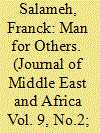|
|
|
Sort Order |
|
|
|
Items / Page
|
|
|
|
|
|
|
| Srl | Item |
| 1 |
ID:
146795


|
|
|
|
|
| Summary/Abstract |
This article mines an early history of modern Lebanon by placing a special focus on the country's Jewish community and examining inter-Lebanese relations where Lebanese Jews take centre stage. Like Lebanon's Christians – Maronites in the main – Lebanon's Jews reveal themselves to have played an important role in the establishment of the Lebanese republic as a ‘confederation of minorities’. But the role of Lebanese Jews was a discreet, low-pitched one, and their ‘voices’ and ‘stories’ seem to have been left out of traditional history books. This article is an attempt at correcting a lacuna of exclusion vis-à-vis Lebanese Jews, mending their memory and restoring them to their rightful place as a foundational element of modern Lebanese history and socio-cultural production.
|
|
|
|
|
|
|
|
|
|
|
|
|
|
|
|
| 2 |
ID:
161162


|
|
|
|
|
| Summary/Abstract |
The mere mention of Henri Lammens, Society of Jesus (SJ), provokes unease, notorious as this militant “priest-scholar” has become in postcolonial circles. Yet his failings notwithstanding, Lammens has been a victim of the academic conceits and biases of postmodernist postcolonialists through whose prisms he often emerges as a cantankerous, inflammatory, Christian polemicist, hell-bent on defaming an otherwise blameless, innocent, beatific Islam. This article suggests that a more nuanced gaze be cast at Henri Lammens, the man and missionary, before judging his scholarship; a corrective of sorts, shedding light on the life and times of a Belgian boy, who traveled East at the tender age of fifteen, who fell into the snare of Near Eastern Christians, and who set out to write their history and restore their suppressed memories—doing so not without the passion and affection of the neophyte.
|
|
|
|
|
|
|
|
|
|
|
|
|
|
|
|
| 3 |
ID:
102595


|
|
|
|
|
| Publication |
2011.
|
| Summary/Abstract |
Since the West's very early flirtations with the modern Near East, and especially in the past 100 years of East-West relations, there has been considerable difficulty in understanding and defining the Middle East, the Arab world, pan-Arabism, Arab nationalism, and Middle Eastern identities in general. The Western impulse of conflating national identity with language, state, and ethnicity - often subsuming Arabic language into Arab ethnicity - has contributed to this misunderstanding and misreading of the region. For, while the Middle East can be accurately referred to by way of the generic 'Arab world' label, the appellation itself is a misleading oversimplification that conceals an inherent diversity and multiplicity of Middle Eastern cultures, ethnicities, languages, and nationalities. And while there is certainly a dominant Arab ethnos, there are also significant numbers of Middle Eastern peoples and nationalities with historical memories and ethno-cultural bonds that challenge the dominant Arabist paradigm. This article proposes a new reading of modern Middle Eastern history and attempts to bring back to the foreground of Middle East Studies the issue of language as a key factor in shaping (and misshaping) the region, with the hope of rediscovering a broader, more honest, and less ideologically tainted discussion on the Middle East and Middle Eastern identities.
|
|
|
|
|
|
|
|
|
|
|
|
|
|
|
|
|
|
|
|
|